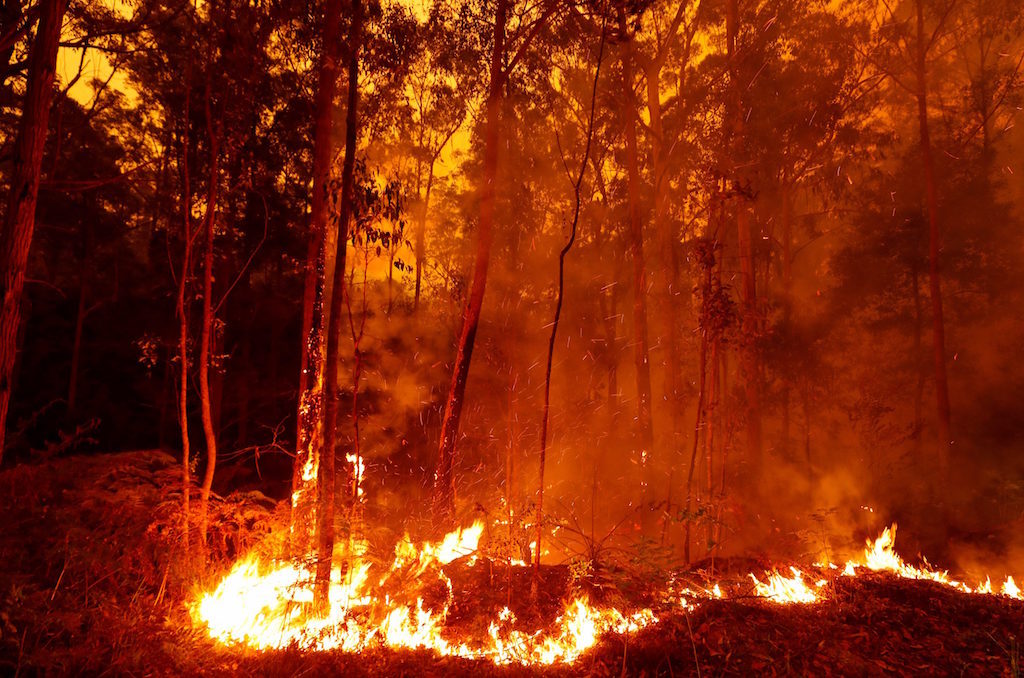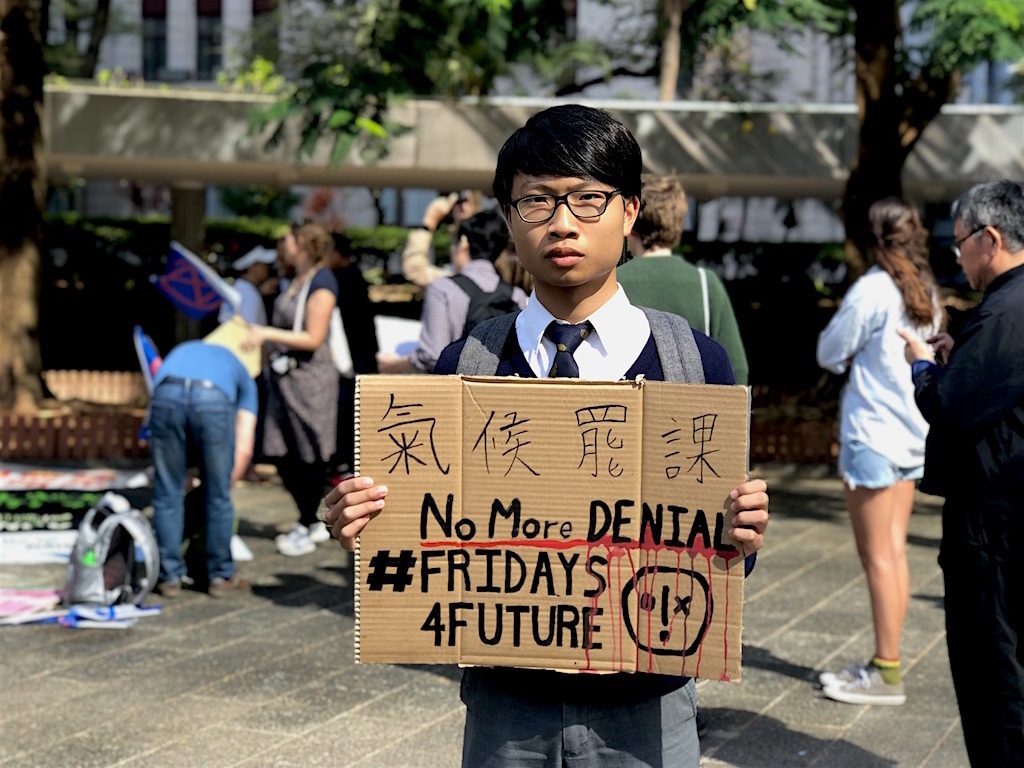6 Mins Read
Australia Fires: At Least 24 People & Half A Billion Animals Dead As Fires Twice The Size Of Belgium Rage On
Wildfires in Australia have turned the eastern part of the country into a scene akin to an apocalyptic nightmare. The fires, which have raged on since September last year, have claimed the lives of at least 24 people and is now threatening to wipe out entire species of animals as an estimated half a billion mammals, birds and reptiles have already been killed. More than 5.9 million hectares of land have been burned through, an area larger than twice the size of Belgium. As the horrific fires continue to raze through the country, more people are finally turning their heads our climate emergency and the deadly consequences of ignoring the world’s most pressing issue – but the reality is that, still, no real climate action is taking place yet.
Blackened skies and raining ash blanketed the entire southeastern part of Australia as wildfires continue to rage on. According to the latest reports, more than 5.9 million hectares or 60,000 square kilometres of land have burned across the country since the fires began in September last year. For comparison, the Amazon fires that swept the Twitterverse into disbelief in the summer of 2019 burned over almost 25,000 square kilometres. Australia’s capital, Canberra, smashed the record for the highest temperature in 80 years over the weekend, with even New Zealand – a country nearly 2,000 kilometres away from Australia – feeling the heat and breathing in smoke.

Right now, around 146 fires are still burning across the state of New South Wales, with 65 remaining uncontained, according to the state’s Rural Fire Service (NSWRFS). In a press conference the NSWRFS Commissioner Shane Fitzsimmons told a news conference that Saturday (4th Jan) was “one of our worst days ever on record.”
This is clearly the worst wildfire season Australia has ever experienced, with many lives lost including several volunteer firefighters, and an estimated half billion mammals, birds and reptiles. With power supplies of major cities under severe threat and the fires showing no end in sight, the devastating death toll for both humans and animals is set to continue to rise.
Images on social media showcased set-alight koalas, kangaroos running from blazes and hundreds of bodies of dead wallabies and wombats lying charred on the ground. According to a statement from ecologists from the University of Sydney, the estimated number of animals killed is likely to be much higher than half a billion, and will threaten to eradicate entire species in a country that already has the highest rate of extinction globally.
In November last year, experts had warned of the possibility that koalas could go “functionally extinct,” and pointed to the significant role of anthropogenic climate change in deeply exacerbating the hundreds of fires in the country, leading to extreme dryness and drought. Now, with the extent of the wildfires reaching new heights and being shared across social media around the world over what was a ghastly holiday season for Australians, experts, scientists and activists all over the world are highlighting that the rise in temperatures must halt if we are to avoid more unprecedented disasters like this in the future.
While 3,000 military reservists were called up over the weekend to fight the fires, we are left to wonder why the action taken by officials was so little, so late? In December, the Australian Prime Minister cancelled the emissions reduction government department and took a family vacation to Hawaii in the midsts of the record-breaking fires before returning to say that the government’s response was the “most comprehensive” to a disaster.
People are stepping up to criticise Mr Morrison’s atrocious absence and mishandling of the crisis, but the reality is that the planet itself is sending dire and deadly signals and still, beyond angry words, nothing is actually being done about our climate crisis to the speed and extent to that is necessary. At a time when our world is supposedly more informed than ever before about the climate and ecological crisis, humans are collectively and continually hampering the little efforts that currently exist to combat the issue.

Yes, despite the fact that 2019 saw over 11,000 scientists declare a “climate emergency”, millions of students strikers take to the streets to demand climate action and catastrophic extreme weather events inundate regions all over the world, we are continuing to wreak havoc on our planet with our wasteful overconsumption culture and addiction to meat and dairy. Major businesses have only just begun to improve the sustainability of their operations and offer more accessible eco-friendly solutions to consumers, and governments continue to lag behind on any substantial commitments to combat the most pressing issue humanity faces today.
Over the holiday season, as the wildfires blackened the skies of southeastern Australia, global e-commerce retailer Amazon reported “record-breaking” sales, with consumers purchasing more than ever before. At the same time, we are seeing billions of parcels being returned, which not only drives up the already astonishing rate at which waste is being landfilled globally, but the greenhouse gases as well. According to tech-driven return processing company Optoro, landfill waste from the 3.5 billion products returned each year from Americans alone amount to an output of 15 million metric tonnes of carbon dioxide into the atmosphere.
Mountains of United Nations-backed evidence piling up about the carbon emissions and resource-intensive nature of industrial animal agriculture has not been met with any slump in global meat and dairy intake. In the wake of our current biodiversity crisis and record-shattering rise in temperatures, which is putting the future of food, health and the environment under extreme threat, demand for meat and dairy keeps going up.
In Hong Kong in particular, we are alarmingly consuming much more seafood, beef, pork and dairy than world averages, making our city one of the world’s top emissions contributors. The reality is that dramatic changes to the way we produce, consume, transport and dispose of food must be made, and without a global shift towards plant-based diet, the future of human civilisation looks bleak.
Although the climate has never received so much global attention, especially in the media, governments continue to drag their feet. In a poll commissioned by non-profit organisation Hope Not Hate, a majority of 75% of people agree that the planet is facing an environmental “emergency” but politicians have failed to respond to the climate breakdown. Instead, world leaders still fall in line and back the interests of oil corporations over the health and wellbeing of citizens.
Even as scientists and activists have made the link between the Australian wildfires, fossil fuels and our climate and ecological crisis, Scott Morrison’s government has simply reaffirmed its commitment to coal and argued that climate change is too “political” an issue to take centre place in the disaster relief discussion. According to Mr Morrison, his administration’s current response is “matching the need”.
What is happening in Australia is simply a glimpse of what is coming if we continue on our trajectory. Climate barbarism from governments and passivity from us as individuals is no longer an option. Our planet is in an emergency, the fire has literally started, and it is well beyond time that we – governments, corporations, individuals – initiate and seriously amplify our global response to the most urgent threat to our existence.
Lead image courtesy of Unsplash.




